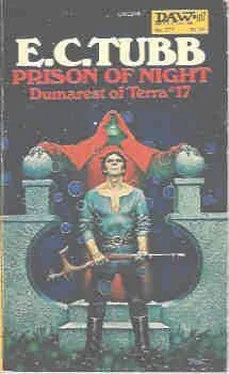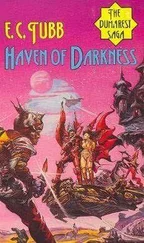E. Tubb - Prison of Night
Здесь есть возможность читать онлайн «E. Tubb - Prison of Night» весь текст электронной книги совершенно бесплатно (целиком полную версию без сокращений). В некоторых случаях можно слушать аудио, скачать через торрент в формате fb2 и присутствует краткое содержание. Жанр: Фантастика и фэнтези, на английском языке. Описание произведения, (предисловие) а так же отзывы посетителей доступны на портале библиотеки ЛибКат.
- Название:Prison of Night
- Автор:
- Жанр:
- Год:неизвестен
- ISBN:нет данных
- Рейтинг книги:5 / 5. Голосов: 1
-
Избранное:Добавить в избранное
- Отзывы:
-
Ваша оценка:
- 100
- 1
- 2
- 3
- 4
- 5
Prison of Night: краткое содержание, описание и аннотация
Предлагаем к чтению аннотацию, описание, краткое содержание или предисловие (зависит от того, что написал сам автор книги «Prison of Night»). Если вы не нашли необходимую информацию о книге — напишите в комментариях, мы постараемся отыскать её.
Prison of Night — читать онлайн бесплатно полную книгу (весь текст) целиком
Ниже представлен текст книги, разбитый по страницам. Система сохранения места последней прочитанной страницы, позволяет с удобством читать онлайн бесплатно книгу «Prison of Night», без необходимости каждый раз заново искать на чём Вы остановились. Поставьте закладку, и сможете в любой момент перейти на страницу, на которой закончили чтение.
Интервал:
Закладка:
E. C. Tubb
Prison of Night
Chapter One
Kars Gartok was the last to leave, lingering in his cabin until the others had gone, unwilling to engage in useless conversation, to hear again the empty threats and bitter denunciations. Only when the ship was silent did he venture forth to step through the open port and head down the ramp to the field below. It was late in the day, the sun low on the horizon, the air misted with a damp fog which pearled the mesh of the perimeter fence and gave the tall figure standing just beyond the gate a blurred, ethereal quality as if it were the figment of a dream.
But Brother Eldon was no ghost. He waited, dressed in a brown, homespun robe the cowl thrown back despite the chill to reveal a face seamed and creased with age and privation. His feet were bare in open sandals and gnarled hands gripped a bowl of cheap plastic chipped and scarred by usage and time. He lifted it as Gartok approached.
"Of your charity, brother."
Halting Gartok stared at the monk then said, dryly, "Charity? Aren't there fools enough on Hyard without you wanting more?"
"Is to give an act of foolishness?"
"What else?"
"Some would call it an act of virtue, brother."
"To give without hope of reward is the act of a fool," said Gartok, curtly. "A lesson a man in my trade quickly learns."
"As those did who left the ship before you?" Then, before Gartok could answer, the monk added, quietly, "It could be that you have already had your reward. You seem uninjured and you are alive."
"Yes," said Gartok, heavily. "I'm alive."
He was a big man, wide of shoulder and thick of neck, dressed in dark leather trimmed with scarlet, polished patches showing at shoulders and waist where body-armor had rested. His temples bore callouses from the weight of a helmet and his eyes, deep-set and hooded, watched from beneath beetling brows. His hands were broad, the fingers spatulate. The knuckles knobs of bone. His face matched the hands, broad, rough, ridged and seamed with scars. The mouth was a trap, the chin a rock, the nose a predatory beak. He looked what he was-a professional dealer in death.
Watching him as he stood there, the mist dewing the stubble of his cropped head, the monk said, "What happened, brother?"
"We lost."
"And?"
"What more needs to be said? We were out-gunned, out-manned, out-maneuvered. Eighty-three of a hundred died on Craig. The details? What do they matter?"
"Even so, brother, I would like to know."
For a moment the mercenary hesitated then, shrugging, said, "It's the old story; two men snarling at each other over a strip of land on a world not worth a woman's spit. Each turned to force and hired men. A minor war and dangerous only to those involved. Or so it should have been but accidents happen. And the locals were stubborn and refused to evacuate their villages."
And so they had died in blossoms of flame as shells had burst in crude houses and fragmentation bombs had torn air and flesh with whining shards of metal. An old story and one common on Ilyard where men came to talk and rest and seek employment. Common too on worlds cursed with ambitious rulers who thought of men as pawns to be used in a complicated game.
"Craig," said the monk. "You said that was the name of the world?"
"Yes. One lying on the edge of the Rift. A bleak place of rock and water and cold. A world where the rich burn turf to keep warm and the poor huddle together. But one the wealthier now for the bodies of good men fertilizing the soil."
"But you are not one of them, brother," reminded the monk and lifted his empty bowl a little. "Those who give to the poor often enjoy good fortune."
A direct appeal to the superstition inherent in all gamblers, and what was a mercenary but a man who gambled with his life? Yet the monk felt no pride of achievement as Gartok plunged a hand into a pocket. Trained in the art of psychology it was simple for him to manipulate the emotional triggers which all men carried and to which they could not help but to respond. And the mercenary, like all his breed, must have inner weaknesses, hidden guilts, invisible cracks in his external armor of competence.
As he threw coins into the bowl Gartok said, "It's all I can give, monk. If it isn't enough to buy a blessing at least spare me your curse."
"I curse no one, brother."
"Then you are more saint than man. I curse people often. Captain Blasco who has a taste for killing. The fool who hired us. The swine who-well, never mind. What is done is done and what point to dwell in the past? But you, Brother, have you any news?" Then, as the monk made no reply, "I forgot, you do not trade in war. But at least tell me this-have any persons of consequence and wealth arrived recently? High lords with ambition and money to hire men?" His eyes narrowed as they searched the old face. Like the monk he had a knowledge of psychology but could read nothing. Then a flicker of the eyes gave him a clue. "They have? You do not deny it? Good. Fortune could be smiling on me at last Where are they staying?"
"You can find out where, brother," said the monk. "As you say, I do not trade in war."
He shivered a little as the mercenary strode away, the wind was increasing and its chill numbed skin and bone. He could barely feel the bowl in his hands and his feet were like blocks of wood yet he welcomed the discomfort as a reminder of times past when, as a young man newly taken into the Church, he had stood before gates like this begging for alms.
An essential duty but one which he no longer had need to perform but old habits died hard and, always, it was necessary to guard against the sin of pride.
And to beg was to be humble.
A gust of wind caught his robe and drove it hard against his body, the damp material emphasizing the chill of the dying day. From the distance came the shouts of men and the monotonous pounding of feet. Raw recruits were at drill; men engaged on a scatter of worlds and transported here to Ilyard where their contracts were sold at a profit. Those who had already been bloodied, who had been flung into combat and who had managed to survive, fetched a higher price than the rest. Others, like Kars Gartok, long freed of contractual restraint, sold their skills to any who would be willing to pay. Their skill and loyalty for what it was worth, going out to fight, to kill, to bleed, to die if they must to live if they could even at the cost of all they owned.
One day, thought the monk, he might be able to understand what drove men to act in such a manner, but for now it was cold, the field was empty and work still waited to be done.
The shadows were lengthening as he reached the first of a litter of shacks and huts which sprawled away from the town to the side of the field. Lowtowns were all the same no matter on which world they were found. The refuge of the desperate, those stricken with illness, those cursed with poverty. The stench of it rose like a miasma from the ramshackle dwellings; constructions of scrap and discarded plastic, of fabrics salvaged from the garbage of the more fortunate, doing little but to keep out the rain and giving a scrap of privacy.
The church was little better, but from intent rather than need. A building of brick or stone with solid walls and barred windows, of thick doors and heated air would have been an affront to those it had been designed to serve. As a monk wearing silk and gems would have insulted the wretch to whom he preached the virtue of poverty. To gain the confidence of those in need they had to be met at their own level.
Yet, even so, the church was bigger and better than others he had known. They had been the flimsy shacks of portable churches: fabric and poles which could be carried on a back together with the benediction light which was the heart of the structure. Yet tent or palace all were the same. All strove to teach the same message. To persuade all who came to listen or who could be persuaded to pay attention to accept the Universal teaching of complete Brotherhood. That no man was an island. That the pain of one was the pain of all. That all shared the burden of a common heritage. That all belonged to the Corpus Humanite. That once each could look at the other and say, there, but for the grace of God, go I, the millennium would have arrived.
Читать дальшеИнтервал:
Закладка:
Похожие книги на «Prison of Night»
Представляем Вашему вниманию похожие книги на «Prison of Night» списком для выбора. Мы отобрали схожую по названию и смыслу литературу в надежде предоставить читателям больше вариантов отыскать новые, интересные, ещё непрочитанные произведения.
Обсуждение, отзывы о книге «Prison of Night» и просто собственные мнения читателей. Оставьте ваши комментарии, напишите, что Вы думаете о произведении, его смысле или главных героях. Укажите что конкретно понравилось, а что нет, и почему Вы так считаете.












